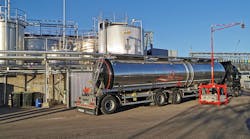Fast moving regulatory go-aheads for process changes coupled with inter-company cooperation are helping the chemical industry fill the gap for Covid-19-related shortages of sanitizer materials.
Specialty chemicals company Perstorp has converted production at its plant near Malmö, Sweden, to deliver over 2 million L/month of hand sanitizer and surface disinfectant to the country’s healthcare sector.
Sweden has struggled with severe disinfectant shortages during the Covid-19 outbreak and Perstorp’s move is expected to more than make up the shortfall. The company is offering the products at cost.
Bringing the supply online has posed both regulatory and logistic challenges. According to a company spokeswoman, the permits and agreements needed for the new production output were finalized with regulatory authorities and other partners in record time. “Things that would normally take weeks or months were achieved in days,” she said.
[pullquote]
The base ingredient for both products is ethanol; vodka specialist Absolut supplied this to Perstorp. It is then mixed with unnamed standard ingredients, although under World Health Organization guidelines these typically include 3% hydrogen peroxide, glycerol and distilled water. The hydrogen peroxide helps eliminate contaminating spores found in bulk solutions; its excipients stabilize the product. Glycerol acts as a humectant to prevent moisture loss.
ExxonMobil, Göteborg, delivered the extra ingredients to Perstorp, while chemical distribution specialist Univar, Malmö, transported the finished product to Lefab Production, Älvängen, for bottling. Lefab’s six automatic filling lines can fill bottles ranging from 1–1,000 L in volume. Lefab’s website notes that currently its production priority is disinfectant filling and that the situation is very volatile and likely to affect its capacity to deal with other products for some time to come.
Socialstyrelsen, the Swedish National Board of Health and Welfare, Stockholm, distributed the first bottles of the new disinfectants across the country on April14.
Perstorp has converted production processes at its main plant to solve a Swedish national disinfection crisis. Source: Perstorp.
“Due to the global Covid-19 pandemic the shortage of disposables such as sanitizers is a major challenge and an issue of great priority. Perstorp has shown tremendous responsibility and initiative in securing the production chain. They have made production possible by arranging all permits from the healthcare sector in cooperation with us, as well as several authorities and other companies,” noted Ingrid Bergman, head of purchasing for the Swedish region of Skåne.
Also in April, Huntsman, The Woodlands, Texas, began manufacturing hand sanitizer at its McIntosh, Ala. site for distribution to healthcare facilities in the United States. The move follows a March announcement that it was to begin making hydro alcoholic solutions to produce hand sanitizer in Switzerland. The plant typically produces high-performance specialty chemicals used in aerospace and other industries.
The U.S. Food and Drug Administration (FDA) issued temporary guidelines giving the company the go-ahead to change production to hand sanitizer.
However, Huntsman doesn’t manufacture isopropyl alcohol (IPA), a key ingredient in some hand sanitizers, so it turned to LyondellBasell, who agreed to supply the IPA needed.
The company donated its first five-ton shipment of sanitizer to Huntsman Cancer Institute (HCI), established by Huntsman founder Jon M. Huntsman, and associated medical facilities at the University of Utah (UH) to help protect healthcare workers.
“This is an incredible example of how leading companies are stepping up to address vital needs of health providers who are on the front lines of battling the coronavirus pandemic. My deepest appreciation to Huntsman Corporation for its innovation and swift response in meeting this need,” said UH president Ruth V. Watkins.
Peter Huntsman, chairman, president and CEO thanked the FDA for moving swiftly to issue the temporary guidelines as it enabled the company to fast-track production and distribution of the much-needed hand sanitizer.
Meanwhile, color and specialty chemicals supplier Archroma, Reinach, Switzerland, has developed a thickener called Mowiplus HPC 9600 to enable brands to create hand sanitizer gel. The company points out that gel sanitizers are considered more user-friendly than liquids, as they avoid spilling and thus wasting the precious sanitizer material that is in critical need for the fight against Covid-19.
Many other chemical makers are helping in various ways, as well. Check www.chemicalprocessing.com/home/covid-19 for ongoing coverage of such efforts.
Seán Ottewell is Chemical Processing's editor at large. You can email him at [email protected].

